Municipality of Ashfield
The Municipality of Ashfield was a local government area in the Inner West of Sydney, New South Wales, Australia. It is about 10 kilometres (6.2 mi) west of the Sydney central business district. The municipality was proclaimed on 28 December 1871 as the "Borough of Ashfield", which changed to the "Municipality of Ashfield" in 1906. On 12 May 2016, Ashfield merged with Marrickville Council and the Municipality of Leichhardt to form the Inner West Council.
| Municipality of Ashfield New South Wales | |||||||||||||||
|---|---|---|---|---|---|---|---|---|---|---|---|---|---|---|---|
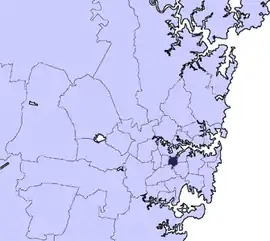 Location in Metropolitan Sydney, 1871–2016 | |||||||||||||||
| Coordinates | 33°53′S 151°08′E | ||||||||||||||
| Population | 41,214 (2011 census)[1] | ||||||||||||||
| • Density | 4,971.5/km2 (12,876/sq mi) | ||||||||||||||
| Established | 28 December 1871 | ||||||||||||||
| Abolished | 12 May 2016 | ||||||||||||||
| Area | 8 km2 (3.1 sq mi) | ||||||||||||||
| Council seat | Civic Centre, Ashfield | ||||||||||||||
| Region | Inner West | ||||||||||||||
 | |||||||||||||||
| |||||||||||||||
The last mayor of the municipality was councillor Lucille McKenna, a member of the Australian Labor Party.[2]
In December 2021, a majority of voters in Inner West Council voted in favour of reversing the 2016 merger and separating the three pre-existing councils of Ashfield, Leichhardt and Marrickville.[3]
Suburbs
The municipality comprised the following suburbs and localities:
It also included parts of:
- Ashbury (shared with City of Canterbury)
- Croydon (shared with Municipality of Burwood)
- Hurlstone Park (shared with City of Canterbury)
- Croydon Park (shared with City of Canterbury and the Municipality of Burwood)
Council history
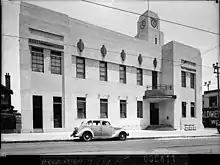
The "Borough of Ashfield" was proclaimed in the New South Wales Government Gazette on 28 December 1871 and was originally divided into two wards, North Ward and South Ward.[4]
Local issues in the area, before the forced merge into Inner West Council, included the redevelopment of Ashfield Mall and concerns about overdevelopment in general;[5] construction of the M4 East tunnel because it might lead to increased traffic and pollution;[6] and the general state of the commercial area, which one councillor labelled 'Trashfield'.[7] Also contentious was Ashfield Council itself. In 2003, it was described by the Daily Telegraph as one of the worst councils in Sydney after one councillor took out a restraining order against another. By 2008, another councillor was sacked for not being a bona fide resident of the municipality while other councillors had made outspoken comments on issues such as the Iraq War, bird flu,[8] the Monarchy and 30 km/h speed limits within residential areas.[9] In 2009, Councillor Nick Adams was given a six-month suspension from the Liberal Party of Australia for conduct deemed likely to "embarrass or cause damage to" the Party during an altercation with a journalist.
A 2015 review of local government boundaries recommended that the Municipality of Ashfield merge with the Municipality of Leichhardt and the Marrickville Council to form a new council with an area of 35 square kilometres (14 sq mi) and support a population of approximately 186,000.[10] On 12 May 2016, Ashfield merged with Marrickville Council and the Municipality of Leichhardt to form the Inner West Council.[11]
Demographics
At the 2011 Census, there were 41,214 people in the Ashfield local government area, of these 48.6% were male and 51.4% were female. Aboriginal and Torres Strait Islander people made up 0.6% of the population. The median age of people in the Municipality of Ashfield was 37 years. Children aged 0 – 14 years made up 15.1% of the population and people aged 65 years and over made up 14.4% of the population. Of people in the area aged 15 years and over, 45.1% were married and 10.0% were either divorced or separated.[1]
Population growth in The Municipality of Ashfield between the 2001 Census and the 2006 Census was 1.76%; while in the subsequent five years to the 2011 Census, population growth was 3.90%. When compared with total population growth of Australia for the same periods, being 5.78% and 8.32% respectively, population growth in Ashfield local government area was significantly less than the national average.[12][13] The median weekly income for residents within the Municipality of Ashfield of was generally on par with the national average.[1]
At the 2011 Census, the proportion of residents in Ashfield local government area who stated their ancestry as Chinese was in excess of four times the state and national averages; and the proportion of households where an Asian language was spoken at home was about six times higher than the national average.[1]
| Historical census data for Ashfield local government area | |||||
|---|---|---|---|---|---|
| Population | 2001[12] | 2006[13] | 2011[1] | ||
| Population | Estimated residents on Census night | 38,981 | 39,667 | 41,214 | |
| LGA rank in terms of size within New South Wales | 54 | ||||
| % of New South Wales population | 0.6% | 0.60% | |||
| % of Australian population | 0.21% | ||||
| Cultural and language diversity | |||||
| Ancestry, top responses | English | 14.9% | |||
| Australian | 14.8% | ||||
| Chinese | 13.3% | ||||
| Italian | 8.5% | ||||
| Irish | 6.9% | ||||
| Language, top responses (other than English) | Mandarin | 6.1% | |||
| Italian | 9.2% | ||||
| Cantonese | 4.9% | ||||
| Nepali | n/c | n/c | |||
| Greek | 2.6% | ||||
| Religious affiliation | |||||
| Religious affiliation, top responses | Catholic | 36.6% | |||
| No religion | 16.9% | ||||
| Anglican | 10.5% | ||||
| Hinduism | n/c | n/c | |||
| Buddhism | 4.2% | ||||
| Median weekly incomes | |||||
| Personal income | Median weekly personal income | A$514 | A$628 | ||
| % of Australian median income | 108.8% | ||||
| Family income | Median weekly family income | A$1,101 | A$1,689 | ||
| % of Australian median income | 107.2% | 114.0% | |||
| Household income | Median weekly household income | A$1,304 | A$1,413 | ||
| % of Australian median income | 111.4% | 114.5% | |||
Council
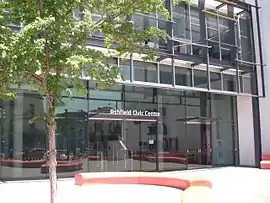
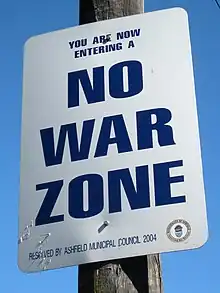

Final composition and election method
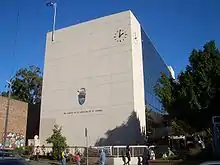
The former Ashfield Municipal Council was generally considered a safe Labor area. As the attached table shows, Labor outpolled all other parties in the area at the final federal, state and council elections before the merge. However, the Liberals and Greens had strong voices in the area with the Council electing a member of the Greens Party as mayor and the northern part of Ashfield was represented by a Liberal Party member in the NSW Parliament. Prior to the 1970s, the area was more conservative, generally returning members who were Free Trade, Nationalist, UAP or Liberal although it wasn't unheard of for Labor members to get elected during this period.[14][15][16]
The final council was composed of four Labor councillors, four independents and four Liberals. The last mayor was Lucille McKenna, the Council's first woman mayor.[17]
Ashfield Municipal Council was composed of twelve councillors elected proportionally as four separate wards, each electing three Councillors. All Councillors were elected for a fixed four-year term of office. The mayor and deputy mayor were elected for a one-year term by the councillors at the first meeting of the council in September. The last election was held on 13 September 2012, and the makeup of the council for the term 2012–16, in order of election by ward, was as follows:[18][19][20][21]
| Ward | Councillor | Party | Notes | |
|---|---|---|---|---|
| East Ward[18] | Julie Passas | Liberal | ||
| Alex Lofts | Labor | Deputy Mayor | ||
| Caroline Stott | Independent | |||
| North East Ward[19] | Ted Cassidy PSM | Independent | ||
| Vittoria Raciti | Liberals | |||
| Lucille McKenna | Labor | Mayor 2013–2016[2] | ||
| North Ward[20] | Adriano Raiola | Liberal | ||
| Monica Wangmann | Independent | |||
| Mei Wang | Labor | |||
| South Ward[21] | Mark Drury | Labor | ||
| Max Raiola | Liberal | |||
| Morris Mansour | Independent | Mayor 2012–2013 | ||
Mayors
| # | Mayor [22] | Party | Term start | Term end | Notes | |
|---|---|---|---|---|---|---|
| 1 | John Pope | 1872 | 1873 | |||
| 2 | Daniel Holborow | 1874 | 1880 | |||
| 3 | Thomas Nicholson | 1881 | 1881 | |||
| 4 | Mark Hammond | 1882 | 1884 | |||
| 5 | John Watkin | 1884 | 1884 | |||
| 1 (2nd term) | John Pope | 1885 | 1885 | |||
| 6 | Joseph Mortley | 1886 | 1887 | |||
| 7 | Joseph Watkin | 1888 | 1888 | |||
| 8 | Thomas Dean | 1888 | 1888 | |||
| 9 | Robert Dougan | 1889 | 1890 | |||
| 10 | Albert Brown | 1891 | 1892 | |||
| 11 | Richard Stanton | 1893 | 7 March 1895 | |||
| 12 | Ninian Melville | Protectionist | 8 March 1895 | 23 February 1896 | [23] | |
| 13 | John Upward | 24 February 1896 | 1897 | [24] | ||
| 14 | Francis Josephson | 1898 | 1898 | |||
| 15 | William Robson | Free Trade | 1899 | 1899 | ||
| 16 | John Mills | 1900 | 1900 | |||
| 17 | Ernest Broughton | Liberal Reform | 1901 | 1902 | ||
| 18 | Arthur Miller | Liberal Reform | 1903 | 1905 | ||
| 11 (2nd term) | Richard Stanton | 1906 | 1906 | |||
| 19 | Charles Webdale | 1907 | 1907 | |||
| 20 | George Brown | 1908 | 1908 | |||
| 21 | Herbert Pratten | Liberal Reform | 1909 | 1911 | ||
| 22 | Alfred Crane | Liberal Reform | 1911 | 1912 | ||
| 23 | Charles Algie | 1913 | 1914 | |||
| 24 | John Hammond | 1915 | 1917 | |||
| 25 | John Yeo | 1917 | 1919 | |||
| 26 | Frank Hedger | Nationalist | 1919 | 1920 | ||
| 27 | George Watson | Nationalist | 1920 | 1922 | ||
| 24 (2nd term) | John Hammond | 1922 | 1923 | |||
| 28 | D McDonald | Nationalist | 1923 | 1925 | ||
| 26 (2nd term) | Frank Hedger | Nationalist | 1925 | 1929 | ||
| 29 | Henry Gough | Nationalist | 1929 | 1932 | ||
| 30 | John Lapish | United Australia | 1932 | 1933 | ||
| 31 | William Grainger | United Australia | 1933 | 1935 | ||
| 32 | Thomas Cavill | United Australia | 1935 | 1938 | ||
| 33 | Edward Allman | United Australia | 1938 | 1943 | ||
| 34 | J Lindsay | 1943 | 1944 | |||
| 32 (2nd term) | Thomas Cavill | Liberal | 1944 | 1946 | ||
| 35 | Ralph Tetley | Liberal | 1946 | 1948 | ||
| 36 | Thomas Marshall | 1948 | 1950 | |||
| 37 | Richard Murden | Liberal | 1950 | 1952 | ||
| 38 | Herbert Bailey | Liberal | 1952 | 1954 | ||
| 39 | James Blackwood | 1954 | 1957 | |||
| 40 | Charles Bullivant | 1957 | 1959 | |||
| 41 | Darrell Jackson | 1959 | 1962 | |||
| 42 | William Peters | Labor | 1962 | 1964 | ||
| 43 | Bede Spillane | Labor | 1964 | 1965 | ||
| 44 | Allan Crawford | 1965 | 1967 | |||
| 37 (2nd term) | Richard Murden | Liberal | December 1967 | September 1972 | ||
| 45 | Paul Whelan | Labor | September 1972 | September 1976 | ||
| 46 | Lew Herman | Labor | September 1976 | September 1991 | ||
| 47 | Dr John Ward | Independent | September 1991 | September 1995 | ||
| 46 (2nd term) | Lew Herman | Labor | September 1995 | September 1996 | ||
| 48 | Vincent Sicari | No Aircraft Noise | September 1996 | September 1997 | ||
| 49 | Mark Bonanno | Labor | September 1997 | March 2004 | ||
| 50 | Rae Desmond Jones | Labor | March 2004 | September 2006 | ||
| 51 | Ted Cassidy | Independent | September 2006 | September 2011 | ||
| 52 | Lyall Kennedy | Greens | September 2011 | September 2012 | ||
| 53 | Morris Mansour | Independent | September 2012 | September 2013 | ||
| 54 | Lucille McKenna | Labor | September 2013 | 12 May 2016 | ||
Coat of arms and logo
_coat_of_arms%252C_granted_1983.jpg.webp) |
|
Logo
Ashfield Council launched a new logo and branding in August 2008, described as an "urban map" of various images representing various buildings and forms in the local area. This branding remained in use (with the arms retained for the most formal uses) until the council's amalgamation.[25]
References
- Australian Bureau of Statistics (31 October 2012). "Ashfield (A)". 2011 Census QuickStats. Retrieved 26 June 2012.
- Murada, Lauren; Murray, Oliver; Hamwi, Omar (26 September 2012). "Marrickville, Ashfield and Leichhardt councils elect new mayors". Inner West Courier. Retrieved 26 September 2012.
- Hore, Allison (16 February 2022). "Inner West Council moves on demerger". Inner West Review. Retrieved 30 March 2022.
- "Government Gazette Proclamations and Legislation". New South Wales Government Gazette. No. 318. New South Wales, Australia. 29 December 1871. p. 2951. Retrieved 3 October 2017 – via National Library of Australia.
- "Mall plans for approval". News Digital Media. Retrieved 7 February 2008.
- "M4 East campaign". Ashfield Municipal Council. Archived from the original on 12 March 2007. Retrieved 6 August 2007.
- "Welcome to Trashfield". News Digital Media. Retrieved 7 February 2008.
- Jennifer Macey (2 November 2005). "Sydney council wants to eradicate pigeons over bird flu". ABC News Australia. Retrieved 16 December 2022.
- "Ashfield goes slow". News Digital Media. Retrieved 7 February 2008.
- "Merger proposal: Ashfield Council, Leichhardt Municipal Council, and Marrickville Council" (PDF). Government of New South Wales. January 2016. p. 7. Retrieved 18 February 2016.
- "Inner West Council". Stronger Councils. Government of New South Wales. 12 May 2016. Retrieved 15 May 2016.
- Australian Bureau of Statistics (9 March 2006). "Ashfield (A)". 2001 Census QuickStats. Retrieved 1 November 2012.
- Australian Bureau of Statistics (25 October 2007). "Ashfield (A)". 2006 Census QuickStats. Retrieved 1 November 2012.
- "Parkes 1901–69". Dr Adam Carr. Retrieved 28 April 2007.
- "Evans". Dr Adam Carr. Retrieved 28 April 2007.
- "Grayndler". Dr Adam Carr. Retrieved 28 April 2007.
- "First Female Mayor elected to Ashfield Council". Ashfield Municipal Council. Retrieved 1 October 2013.
- "Ashfield East Ward". Electoral Commission of New South Wales.
- "Ashfield North East Ward". Electoral Commission of New South Wales.
- "Ashfield North Ward". Electoral Commission of New South Wales.
- "Ashfield South Ward". Electoral Commission of New South Wales.
- List of mayors taken from plaques inside Ashfield Council Chambers
- "Borough of Ashfield". New South Wales Government Gazette. No. 175. 12 March 1895. p. 1766. Retrieved 2 June 2021 – via Trove.
- "Borough of Ashfield". New South Wales Government Gazette. No. 325. 28 April 1896. p. 2997. Retrieved 2 June 2021 – via Trove.
- "Corporate Branding". Ashfield Council. Archived from the original on 12 May 2016. Retrieved 14 October 2017.